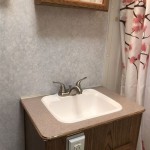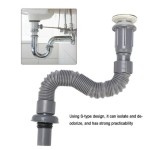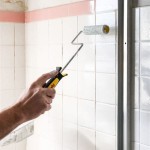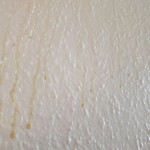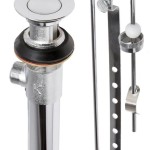How to Replace Bathroom Shower Tiles: A Comprehensive Guide
Replacing shower tiles can significantly enhance the aesthetics and functionality of your bathroom. Whether you're tackling a small repair or a complete bathroom renovation, following the steps outlined below will ensure a successful and professional-looking result.
Essential Tools and Materials
- Tile removal tool (oscillating multi-tool, hammer and chisel, or pry bar)
- Grout saw
- Safety goggles
- Respirator
- New tiles
- Thinset mortar
- Grout
- Grout float
- Tile spacers
- Level
- Caulk gun
- Caulk
- Sponge
- Bucket
Safety Precautions
Before starting, ensure you take the necessary safety precautions. Wear safety goggles and a respirator to protect yourself from dust and debris. If using power tools, follow the manufacturer's instructions carefully.
Step 1: Remove the Old Tiles
Start by removing the old grout around the tiles using a grout saw. Use a tile removal tool to carefully pry off the tiles one by one. Avoid damaging the underlying backer board or drywall. If necessary, use a hammer and chisel to break up stubborn tiles.
Step 2: Clean the Surface
Once the old tiles are removed, thoroughly clean the surface of the backer board or drywall. Remove any remaining grout or adhesive using a putty knife or scraper. Use a damp sponge to wipe away any dust or debris.
Step 3: Apply Thinset Mortar
Mix the thinset mortar according to the manufacturer's instructions. Using a notched trowel, apply a thin layer of thinset mortar to the prepared surface. Ensure the mortar is evenly distributed, avoiding any gaps or voids.
Step 4: Set the New Tiles
Starting from the center of the shower area, carefully set the new tiles into the thinset mortar. Use tile spacers to maintain even gaps between the tiles. Press each tile firmly to ensure good adhesion.
Step 5: Level the Tiles
Use a level to check if the tiles are level. If necessary, adjust the tiles by pushing or pulling them as needed. Ensure that the tiles are flush with each other and do not have any uneven or raised areas.
Step 6: Apply Grout
Once the tiles are set and leveled, allow the thinset mortar to cure for the recommended time. Mix the grout according to the manufacturer's instructions and apply it to the joints between the tiles using a grout float. Work the grout into the joints, ensuring that it fills all the gaps.
Step 7: Remove Excess Grout
After the grout has set for 10-15 minutes, use a damp sponge to remove any excess grout from the tiles' surface. Rinse the sponge frequently to prevent transferring grout to other areas. Wipe the tiles clean with a soft cloth.
Step 8: Caulk Around the Edges
To prevent water from seeping behind the tiles, apply a bead of caulk around the edges of the shower, where the tiles meet the walls or fixtures. Use a caulk gun to apply the caulk smoothly and evenly. Smooth it out with a damp finger or a caulk finishing tool.
Conclusion
Replacing bathroom shower tiles can be a rewarding DIY project with careful planning and attention to detail. By following these steps and taking the necessary safety precautions, you can create a stunning and functional shower that will enhance the overall aesthetic of your bathroom for years to come.

How To Prep And Install Diy Bathroom Shower Tile Lowe S

Tips On How To Remove Old Shower Tile Ugly Duckling House

How To Remove Bathtub Shower Wall Tiles

The Complete Guide To Installing Tile On Shower Or Bathtub Walls

How To Install A Shower Tile Wall Bathroom

How To Remove Replace One Bathroom Tile Ceramic Repair

How To Tile A Basement Shower The Home Depot

How Do I Repair Tile In A Shower Ceramic

How To Upgrade Bathroom Tile Without Replacing

Removing An Old Shower Tile Border Young House Love
